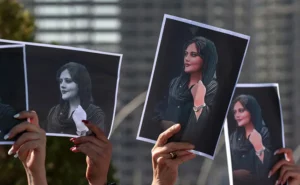Washington Post journalist Jason Rezaian spoke to prominent Iranian human-rights activist Narges Mohammadi as she faces yet another outrageous prison sentence in Iran. Rezaian is no stranger to the unjust practices of the Iranian judicial system, which imprisoned the journalist on spurious charges for 544 days in 2014-16. In her interview calls with Rezaian, Mohammadi discussed Iranian civil society, the need to prioritize human rights, and how sanctions have harmed Iran’s democracy movement.
It should come as no surprise that a well-known activist like Mohammadi would call on Western countries to respect Iranian civil society and prioritize human rights as part of the ongoing negotiations with Iran. Mohammadi was critical of Enrique Mora, who heads the E.U. delegation, for not meeting with human rights activists in Iran as his predecessor did leading up to the 2015 JCPOA agreement, “Right now, we need serious support from the West, from human rights organizations and the international community.” Mohammadi also emphasized the need for Western nations to support the democratic movement inside Iran, led by Iranians themselves.
Additionally, Mohammadi is critical of the U.S. policies on Iran that have helped to bolster the most repressive elements of the state. In the case of sanctions, Mohammadi suggested that such broad-based measures actually undermine Iran’s democracy movement, stating: “Economic sanctions, because they weren’t targeted or based on adequate knowledge of the state, weakened Iranians economically more than they weakened the Iranian regime…In fact, they strengthened the Iranian regime, and hard-line individuals and groups in the country, including the Islamic Revolutionary Guard Corps. This did not benefit democracy in Iran.”
Mohammadi has spent much of her life over the last two decades struggling against the injustice of a system that mistreats its citizens and targets those who voice their discontent. She has been in and out of prison for her work as a human rights activist, in which she advocates the abolition of the death penalty, calls for women’s rights, and supports the victims of state violence. Even from prison, Mohammadi refused to be silenced, and instead protested and documented the abuses within prisons, such as solitary confinement.
Earlier this year, Mohammadi was sentenced yet again to eight years in prison and 70 lashes, revealing the brutal nature of Iran’s so-called “justice” system. Showing her continued resilience in the face of gross injustice, Mohammadi’s most recent act of civil disobedience is her refusal to report to prison to serve a new sentence on charges she denies and which was meted out in a trial that lasted only minutes. Mohammadi represents millions of Iranians who simply wish to see their lives improved and the principles of human rights and democracy upheld, they deserve nothing less.
Back to top

